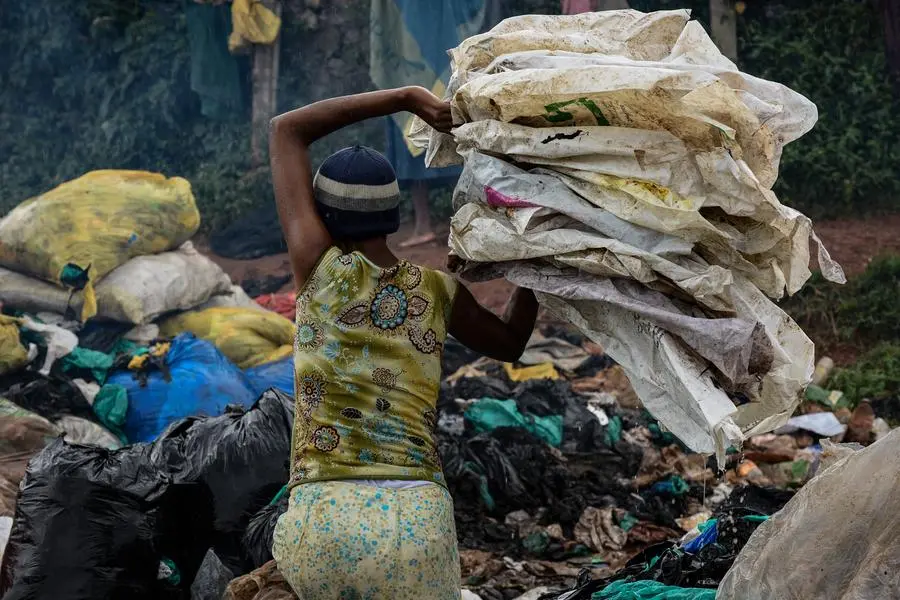PHOTO
A dumpsite near Entebbe International Airport is raising safety concerns about bird strikes on aircraft.
Pilots and airline operators have expressed their concerns about the continued use of the Nkumba waste site, nearly four months after the Kampala Capital City Authority (KCCA) was ordered to stop using it.
Kampala generates about 2,500 tonnes of garbage daily but only collects 1,200 tonnes by trucks. KCCA began dumping garbage near the airport after the Kitezi landfill collapsed in August, killing 34 people. Some 28 people are still missing.
The city administration failed to decommission the Kitezi landfill, which had operated for about a decade beyond its intended lifespan.
It has been seeking alternative locations, but its contractors collect waste in Kampala under the cover of darkness and dump it in Entebbe Municipal Council, according to Mayor Fabrice Rulinda.
Captain Stephen Wegoye, Head of Security and Safety at Uganda Airlines, says the Nkumba dumpsite is attracting large birds, which increases chances of bird-aircraft collisions, which could result in damaged propellers, windshields or fuselage, putting lives at risk.
In some airports globally, fatalities have been reported due to bird strikes.
Uganda Airlines has experienced six incidents of aircraft-bird hits in the past five years, resulting in expensive repairs.
Jenifer Bamuturaki, Uganda Airlines CEO recently launched the carrier’s Flight Path Sustainability Project to reduce waste and aircraft-bird collisions.“Bird strikes pose a serious challenge to aviation globally, and Entebbe International Airport is no exception. This project aims to reduce bird concentrations near our flight paths by 40 percent, ensuring safer skies for all,” she said.
Uganda Airlines has not disclosed the cost of bird-strike related damage but Kenya Airways recently told lawmakers in Nairobi that it had spent $75 million on aircraft repairs due to bird strikes at the Jomo Kenyatta International Airport over the past four years.
Ms Bamuturaki said that Uganda Airlines is not only addressing safety, but also taking a holistic approach to environmental conservation around its hub by protecting the Mabamba Bay ecosystem and promoting sustainable waste management practices.
Mabamba Bay is a wetland on the edge of Lake Victoria, northwest of the Entebbe peninsula in a village called Kasanje. It covers 2,424 hectares and is home to more than 300 bird species. The Mabamba Swamp is famous for lungfish.
Retired pilot Francis Babu said bird strike threats are high in March and October, when some of the migratory and local bird species, including African fish eagles, black kites, black headed herons, swallows, marabou storks, gulls, terns and egrets, visit Mabamba.
Frank Rusa, KCCA acting executive director, acknowledged that dumping waste in Entebbe Municipality may cause safety and ecological problems, but said Kampala had stopped using the Entebbe site and switched to Katikolo dumpsite in Mukono District.
But in the last week of November, the National Environmental Management Authority inspections team confirmed that KCCA was still dumping waste in the wetland separating the dumpsite from Lake Victoria, posing severe risks to both the surrounding ecosystem and public health.
Nema now wants Entebbe Municipal Council to restore the wetland to its original state.“The management of the Nkumba Waste Dumping Site falls short of compliance requirements under the National Environment Act, Cap. 181, the National Environment (Waste Management) Regulations S. I. 49 of 2020, the conditions of Environmental and Social Impact Assessment (ESIA) approval, and the Guidelines for the Management of Landfills in Uganda, 2020,” it said in a November 25 statement.
© Copyright 2022 Nation Media Group. All Rights Reserved. Provided by SyndiGate Media Inc. (Syndigate.info).




















